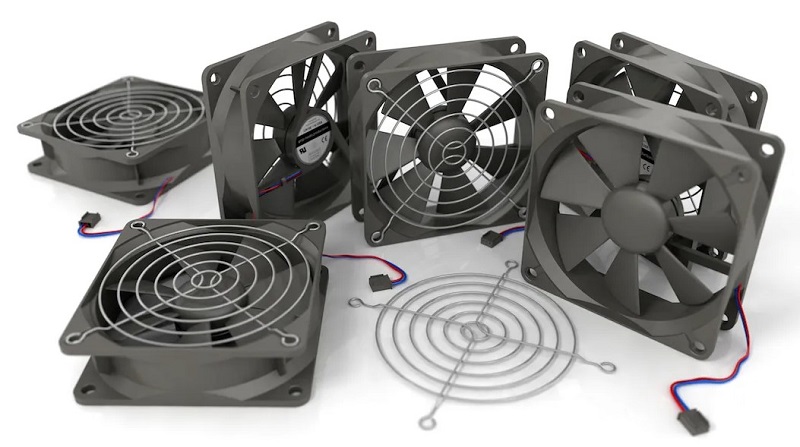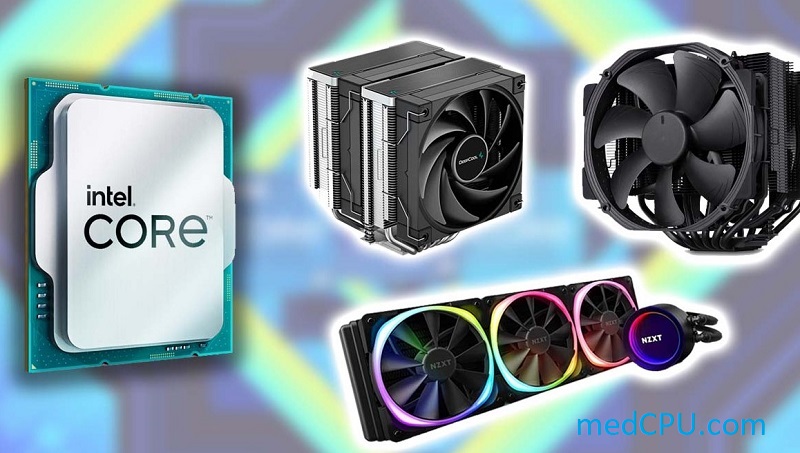Do you find yourself asking, “Why is my CPU cooler so loud?” You’re not alone! Many computer users face this common issue. In this blog post, medCPU will explore the reasons behind noisy CPU coolers and provide effective solutions for quieting your computer’s cooling system.
Ready to silence that annoying fan noise? Let’s dive in!
Common Reasons for a Loud CPU Cooler
One common reason for a loud CPU cooler is dust buildup on the fan.
Dust buildup on the fan
Dirty fans are one of the main suspects when it comes to a loud CPU cooler. As dust accumulates on the fan blades over time, it can cause an imbalance in the operation. This imbalance forces your fan to work harder and spin at higher RPMs than designed for normal functioning, creating excessive noise.
Not only does this buildup increase noise levels, but it also reduces airflow efficiency and cooling capabilities which could lead to elevated internal temperatures and potentially damage your components if left unchecked.
Hence, regular cleaning is crucial for maintaining the optimal performance of your cooling system.
Overheating of the CPU
Overheating of the CPU can result in a loud CPU cooler. When the internal temperature of the CPU rises too high, it causes the fan to spin at a higher RPM in an attempt to cool it down.
This increased speed creates more noise, and you may notice a louder-than-usual fan noise coming from your computer. To prevent overheating, ensure that there is proper airflow around the CPU by keeping vents clear of dust and obstructions.
Additionally, optimizing CPU performance can reduce heat generation and help keep temperatures within normal limits. Regularly monitoring and controlling the temperature of your CPU is crucial for maintaining a quiet and efficient cooling system.
Faulty or worn-out fan
A faulty or worn-out fan can be one of the common reasons why your CPU cooler is so loud. When a fan starts to fail, it may begin making unusual noises such as clicking, buzzing, or grinding sounds.
This can be caused by issues with the fan motor or bearings. Over time, fans can also wear out due to regular use and accumulation of dust and debris. If you notice that your CPU cooler’s fan is making excessive noise, it’s likely time to replace it with a new one to ensure proper cooling and reduce the noise level in your system.

Improper fan placement
Incorrect fan placement can contribute to a loud CPU cooler. If the fan is positioned too closely to other components or obstructed by cables, it may not be able to effectively cool the CPU.
This can cause the fan to spin faster and generate more noise in an attempt to dissipate heat. Additionally, if the fan is facing the wrong direction or installed improperly, it may not be able to efficiently exhaust hot air from the system, leading to increased temperatures and louder noise levels.
Properly positioning and installing the fan can help optimize airflow and reduce excessive noise.
Solutions for a Loud CPU Cooler
- Clean the fan and vents to remove dust. This can improve airflow and reduce noise levels.
- Ensure proper airflow around the CPU by organizing cables and removing any obstructions.
- Check and replace faulty fans that may be causing the excessive noise.
- Optimize CPU performance to reduce heat generation, which can lead to quieter operation.
Learn more about these solutions to silence your loud CPU cooler!
Clean the fan and vents to remove dust
To address a loud CPU cooler, one of the common solutions is to clean the fan and vents to remove dust buildup. Over time, dust can accumulate on the fan blades and in the vents, obstructing airflow and causing the fan to work harder than necessary.
This increased workload often leads to louder noise levels as the fan operates at higher RPMs.
To remedy this issue, simply turn off your computer and unplug it from any power source. Then, using compressed air or a soft brush, carefully clean off any visible dust from both the external fan blades as well as inside the vents.
Ensure proper airflow around the CPU
Proper airflow around the CPU is crucial in preventing a loud cooler. When there isn’t enough circulation, heat can build up, causing the fan to work harder and produce more noise.
To ensure proper airflow, make sure that all vents are clear of any obstructions and that cables or wires are not blocking the fan’s path. Positioning your computer in a well-ventilated area with ample space for air to flow freely will also help in reducing noise caused by an overheated system.
Check and replace faulty fans
If your CPU cooler is producing loud noises, it could be due to faulty or worn-out fans. Over time, the bearings in the fan can wear down, causing it to become noisy and inefficient.
To solve this issue, you should check the fans on your CPU cooler and replace any that are malfunctioning. This simple step can help reduce the noise level significantly and improve cooling performance.
By ensuring that all fans are in good working condition, you can maintain a quieter and more efficient CPU cooling system for optimal performance.
Optimize CPU performance to reduce heat
To reduce heat and minimize the workload on your CPU cooler, it’s crucial to optimize your CPU performance. Start by closing any unnecessary programs or processes running in the background, as they can generate excess heat.
Additionally, make sure you have the latest software updates installed, as they often include optimizations for better thermal management. Adjusting power settings to prioritize energy efficiency can also help regulate CPU temperature.
Finally, consider overclocking only if you have adequate cooling solutions in place since it increases heat output significantly.
>>> Read more: Best Cpu Cooler For Gaming In 2023
Additional Tips to Reduce CPU Cooler Noise
- Adjust fan speed settings to lower RPM and reduce noise.
- Use noise-dampening materials, such as rubber or foam, to absorb vibrations and minimize sound.
- Consider upgrading to a more efficient CPU cooler with better noise-reduction capabilities.
- Check for software issues that may be causing high CPU usage and resulting in noisy fans.
Adjust fan speed settings
To reduce the noise generated by your CPU cooler, adjusting the fan speed settings is an effective solution. Most modern motherboards have BIOS or software utilities that allow you to control the fan speed.
By lowering the RPM (rotations per minute) of the fan, you can significantly decrease the noise level while still maintaining adequate cooling for your CPU. This can be done through BIOS settings or using third-party software tools designed for fan control.
Experiment with different fan speed settings until you find a balance between noise reduction and sufficient cooling performance for your system.
Use noise-dampening materials
To help reduce the noise produced by your CPU cooler, you can consider using noise-dampening materials. These materials are designed to absorb and dampen sound vibrations, minimizing the overall noise generated by your cooling system.
You can place these materials around the fan or inside your computer case to help create a quieter environment for your CPU cooler. Some popular options include foam pads, rubber grommets, and soundproofing mats.
By incorporating these materials into your setup, you can effectively reduce the noise level of your CPU cooler without compromising its performance.
Consider upgrading to a more efficient CPU cooler
Upgrading to a more efficient CPU cooler can greatly help in reducing the loud noise produced by your current one. A more advanced and modern cooling system will have better design and technology, allowing for improved airflow and heat dissipation.
This means that the fan won’t have to work as hard or at higher RPMs to keep your CPU cool, resulting in quieter operation overall. Investing in a silent CPU cooler will not only reduce noise pollution but also contribute to better system performance and longevity.

Check for software issues that may be causing high CPU usage
Software issues can sometimes cause your CPU to work harder, leading to increased heat and fan noise. One way to address this is by checking for any programs or processes that may be using a high percentage of your CPU’s resources in the Task Manager.
Close unnecessary applications and consider uninstalling any resource-intensive software that you no longer need. You can also update your software to the latest version, as newer versions often come with performance improvements and bug fixes that can help reduce CPU usage and fan noise.
Regularly scanning your system for malware or viruses is also important, as these malicious programs can cause excessive CPU usage and make your cooler louder.
Importance of Maintaining a Quiet CPU Cooler
Maintaining a quiet CPU cooler is important for improved system performance, an enhanced user experience, and minimizing distractions and noise pollution.
Improved system performance and lifespan
A quiet CPU cooler not only reduces noise pollution but also plays a crucial role in improving the overall system performance and lifespan. When the CPU cooler is loud, it often means that the cooling system is struggling to maintain an optimal internal temperature, leading to potential overheating issues.
This can result in decreased performance, frequent crashes, and even permanent damage to sensitive components like the processor. By addressing a noisy CPU cooler promptly, you can ensure efficient heat dissipation and prolong the lifespan of your computer while enjoying smoother operation and enhanced productivity.
Enhanced user experience
A quiet CPU cooler can greatly enhance the user experience by eliminating annoying distractions and reducing noise pollution. No one wants to hear a constant buzzing or grinding noise while using their computer, as it can be highly disruptive and frustrating.
With a quieter CPU cooler, users can enjoy a more peaceful computing environment that allows them to focus on their tasks without being constantly reminded of the loud fan noise. Overall, a silent CPU cooler contributes to an overall smoother and more enjoyable user experience.
Minimized distractions and noise pollution
A quiet CPU cooler can greatly minimize distractions and noise pollution in your workspace. Loud fan noises can be incredibly distracting, especially when you’re trying to concentrate on a task or enjoy some peace and quiet.
By maintaining a quiet CPU cooler, you can create an environment that is conducive to productivity and focus. Additionally, reducing noise pollution from your computer can also benefit those around you, such as coworkers or family members who may share the same space.
So by addressing the issues causing a loud CPU cooler, you not only improve your own experience but also create a more peaceful atmosphere for everyone involved.
Conclusion
In conclusion, a loud CPU cooler can be caused by various factors such as dust buildup, overheating of the CPU, faulty fans, or improper placement. However, there are several solutions available to reduce the noise and ensure optimal performance of the cooling system.
By cleaning dust, improving airflow, replacing faulty fans, and optimizing CPU performance, users can enjoy a quieter and more efficient computer experience. It is essential to address this issue promptly to prevent potential damage to the system and enhance overall user satisfaction.
FAQs: Why Is My CPU Cooler So Loud
1. Why is my CPU cooler making loud noises?
There are several reasons why your CPU cooler may be making loud noises, including a buildup of dust or debris, a faulty fan bearing, or an issue with the fan speed settings.
2. How can I reduce the noise from my CPU cooler?
To reduce the noise from your CPU cooler, you can try cleaning any dust or debris that may have accumulated on the fan blades and heatsink. You can also adjust the fan speed settings in your computer’s BIOS or use software to control it.
3. Is it normal for a CPU cooler to make noise?
It is normal for a CPU cooler to make some noise, especially when it is working harder to cool down your processor during intensive tasks. However, excessively loud or unusual noises could indicate a problem that needs attention.
4. When should I consider replacing my CPU cooler?
You may need to consider replacing your CPU cooler if it continues to make loud noises even after cleaning and adjusting the fan speed settings. Additionally, if you notice high temperatures or frequent overheating issues with your processor, it could be a sign that the cooling system is not functioning properly and requires replacement.

Eyal Ephrat serves as the co-founder and CEO of medCPU.com, where technology is making significant strides in the field of medicine. Through his experience in purchasing PC and laptop equipment and various other tech products, Eyal Ephrat contributes valuable insights to medCPU’s mission.
